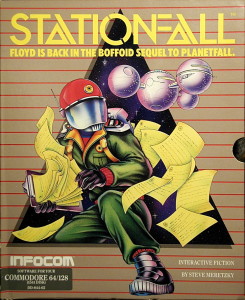It’s all too easy to underestimate Steve Meretzky. Viewed from on high, his career is a long series of broad science-fiction or fantasy comedies — fun enough, sure, but not exactly the most challenging fare. Meretzky, it would seem, learned what worked for him in 1983 when he wrote his first game Planetfall and then just kept on doing it. The lukewarm commercial and critical response to his one great artistic experiment, 1985’s A Mind Forever Voyaging, only hardened the template that would hold true for the remainder of his career.
Such a dismissive summary, however, is unfair in at least a couple of ways. First of all, it fails to give due credit to Meretzky’s sheer design craft. By the time he entered the second half of the 1980s with a few games under his belt, he was second to no one on the planet in his ability to craft entertaining and fair puzzles, to weave them together into a seamless whole, and to describe it all concisely and understandably. Secondly, and more subtly, his games weren’t always quite as safe as they first appeared. Merezky often if not always found ways within his established templates to challenge his players’ expectations and give critics like me something to talk about all these years later: the endearing Floyd and his shocking death in Planetfall; the political statement in the era of Ronald Reagan and the Moral Majority that sex could be fun rather than dirty — arguably more effective in its easy-going way than A Mind Forever Voyaging‘s more hectoring tone — that’s embedded within Leather Goddesses of Phobos. Nowhere are Meretzky’s talent for pure game design and his willingness to slyly subvert his wheelhouse genre more highlighted than in Stationfall, his game of 1987.
A sequel to Planetfall had been quite a long time coming. Floyd had offhandedly promised one at the end of that game, but any plans Meretzky may have had to turn it into a franchise were overwhelmed by Infocom’s need to get the next Enchanter trilogy game done, the need for a Douglas Adams collaborator, and soon enough by new ideas from Meretzky himself. After the Activision buyout, with Infocom in general becoming much more willing to mine their own past in search of that elusive, much-needed hit, he debated for some time whether to do a Planetfall sequel at last or a new Zork game. In the end Brian Moriarty took Zork, and thus the die was cast. Meretzky’s sixth and, as it would transpire, final all-text adventure game would be a sequel to his first.
Stationfall reunites you almost immediately with Floyd, the lovable robot companion who remains for most players the most memorable aspect of Planetfall. Your exploits in the first game led to a promotion from Ensign Seventh Class to Lieutenant First Class, but your actual duties aren’t much more interesting now than they were then. Instead of pushing a mop around, you now spend your days pushing paper around. Your assignment for today is to take a space truck from your ship to a nearby space station to pick up a set of “Request for Stellar Patrol Issue Regulation Black Form Binders Request Form Forms” — something of an Infocom in-joke, an extrapolation of Meretzky’s love for real-life “memo hacking”. You pick up a robot from the pool to help you on the trip, and, lo and behold, it turns out to be good old Floyd, whom you’ve seen “only occasionally since he opted for assignment in the Stellar Patrol those five long years ago.” When you and Floyd arrive at your destination, you find it deserted. Where has everyone gone? Much like in Planetfall, you will have to figure out what happened here and how to stop it from continuing to happen if you hope to escape alive.
Floyd is in as fine a form as ever. Some parts of his schtick are recycled from the first game, other parts adorably new.
>sit in pilot seat
You are now in the pilot seat. Floyd clambers into the copilot seat, his feet dangling a few centimeters short of the floor. "Let Floyd launch the spacetruck? Please? Floyd has not crashed a truck in over two weeks!"
>floyd, launch spacetruck
"Floyd changed his mind. Controls too scary-looking."
As in the first game, part of the genius of Floyd is that you never know quite what he really looks like. You hear at various times that he has legs, eyes, can cry oily tears and can smile, but you get no explicit description. This leaves each player to construct her own idealized image, whether based on kittens or puppies or children or whatever represents the ultimate Cute for her personally.
Floyd, of course, simply has to be in any game that dares to bill itself as a sequel to Planetfall. More notable is just how thoroughly Stationfall embraces the idea of being a sequel in other ways. The deserted planetside research complex has been replaced with a deserted space station, but otherwise the environments are remarkably similar. Like in Planetfall, you’re racing against a deadly disease that will kill you if you take too long. Other aspects of Stationfall are so faithful to the original as to feel downright anachronistic in an Infocom game of this late vintage. Hunger and sleep timers make their first appearance in years, and the environment is liberally sprinkled, although not quite so maddeningly as in Planetfall, with red herrings and rooms whose only purpose is to add verisimilitude. Among the latter, for example, are the ubiquitous “SanFacs,” included here just as they were in Planetfall as an answer for every kid who ever watched Star Trek and asked just where you pooped aboard the Enterprise. The returning elements are so numerous as to feel pointless to try to exhaustively catalog: the yucky but good-tasting goo that is the staple of your diet; the tape spools you use in combination with the library’s reader to ferret out clues; the magnetic key cards that are cruelly easy to corrupt and thereby lock yourself out of victory (one of my few quibbles with a mostly superb game design); the control-room monitors that helpfully break down the status of every subsystem into a simple green, yellow, or red. It’s all so similar that the differences, like the realization that your goal this time isn’t to actually repair the station, arrive as something of a shock.
Yet if Stationfall is by conscious choice a throwback, it’s also a testament to just how far Steve Meretzky had come as a designer in the four years since Planetfall. That first game he ever wrote can feel at times like it’s rambled out of its maker’s control, leaving its various bits and pieces to dangle unconnected in the breeze. Stationfall in contrast is air-tight; even its red herrings are placed with purpose. Meretzky knows exactly what he’s doing at every juncture, is in complete control of his craft; all of its bits and pieces fit together seamlessly. Particularly noticeable is just how much better of a writer Meretzky has become, the continuation of a trend that began to reach a certain fruition in 1986’s Leather Goddesses, the game for which Infocom’s unsung hero Jon Palace made a special effort to help him to “sensualize” his text. Almost entirely gone now are the off-hand, even lazy descriptions that creep into Meretzky’s early games, when he tended to tell too much and show too little in his hurry to get to the next really exciting part. I’m tempted to give you an example at this point, but, textual sensualizing or no, he still isn’t the kind of writer that dazzles you with his poetry. Stationfall‘s text is rather impressive in the cumulative. After playing for a long while, you begin to realize that its simple, sturdy diction has quietly given you a pretty darn good sense of where you are and what you’re doing.
Lest it all start to feel too dry, the robots are a constant source of amusement. I say “robots” here because early on you find another friend to join you and Floyd, a gangly, chatty metal nerd named Plato — C-3PO to Floyd’s R2-D2 — who proves almost as lovable.
"I am quite surprised to discover you here," says the robot. "I have not seen a soul for a day now, perhaps more. But look, here I am forgetting my manners again. I am known as Plato to the humans on this station, and I am most gratified to make your acquaintance."
Plato reaches the last page of his book. "Heavens! It appears to be time for another jaunt to the library. Would you care to accompany me, my boisterous friend?"
"Oh boy yessiree!" says Floyd, bounding off after Plato. "I hope they have copies of my favorite comic, THE ADVENTURES OF LANE MASTODON!"
Floyd really ought to go into advertising as a product-placement expert…
The remainder of this article will spoil the plot and ending of Stationfall (and Planetfall as well), along with a couple of the final puzzle solutions. If you want to experience Stationfall unspoiled, by all means go do so and come back later. The experience of playing with no preconceptions is well worth having.
And then, perhaps at about the point when you’re really starting to appreciate just what a well-crafted and charming traditional adventure game you’re playing, Stationfall starts to get deeply, creepily weird.
Like so much else in Stationfall, its darker shadings don’t arise completely out of the blue. Some of the same atmosphere of dread and paranoia was lurking beneath the surface goofiness in Planetfall as well; the background to that game was after all a devastating pandemic that was slowly killing you as well as you messed about with Floyd and chowed down on colored goo. Stationfall, however, slowly becomes darker and more subversive than its predecessor ever dared. To understand the difference between the games, we might begin by noting how their plots unfold. In Planetfall you can revive virtually the entire population of the planet Resida after discovering the cure for the pandemic that has struck it, effectively turning back the clock and making everything right again — including, as it turns out, the supposedly “dead” Floyd. In Stationfall, dead is dead; the crew of the space station is gone and they’re not coming back. It feels like the work of an older, more world-weary writer. Yet even that description doesn’t quite get to the heart of the tonal shift that Stationfall undergoes over the course of your playing. It becomes a comedic text adventure filtered through the sensibility of David Lynch, unsettling and just somehow off in ways that are hard to fully describe.
But describe it I must — that’s why we’re here, isn’t it? — so maybe I should start by explaining what’s actually going on on this station. In yet one more homage to Planetfall, it has indeed been infected by a deadly virus. This, however, is a virus of another stripe, computerized rather than biological. It infects any machinery with which it comes into contact, causing the gadgets that make life possible in space to gradually “turn against their creators.” This, then, is the fate that’s been suffered by the people who used to crew the station. As you wander about the station and time passes, you begin to see more and more evidence of the process that’s underway. The automatic doors, for instance, no longer whisk efficiently open and shut for you, but open “barely wide enough for you to squeeze through. As you do so, the door tries to shut, almost jamming against you!” (This progression doesn’t quite make logical sense, as the station has already killed its entire crew, but it’s so effective in context that I’m happy not to nitpick unduly.)
Creepiest of all is what begins to happen to Plato and your old buddy Floyd. The messages describing their antics begin to change, subtly at first but then unmistakably.
Floyd produces a loud burp and fails to apologize.
Floyd stomps on your foot, for no apparent reason.
Floyd meanders in. "You doing anything fun?" he asks, and then answers his own question, "Nope. Same dumb boring things." You notice that Plato has also roamed into view behind Floyd, once again absorbed in his reading.
"Let us take a stroll, Floyd," says Plato, tucking his book under one arm. "Tagging along after this simpleton human is becoming tiresome." He breezes out. Floyd hesitates, then follows.
It’s Plato who tries to kill you first, whereupon Floyd comes to your rescue one last time. But his resistance to the virus won’t last much longer. When you try to hug him to thank him for his deed, “Floyd sniffs, ‘Please leave Floyd alone for a while.'” He shows up from time to time after that, growing ever more rude and petulant. And then he’s simply gone, who knows where, doing who knows what. By now any traces of goofy comedy are long gone. Many players of Planetfall have described how much they missed Floyd after his final sacrifice for their sake, how empty and lonely the complex suddenly felt. Yet that feeling of bereavement was as nothing compared to the creeping dread you’re now feeling, waiting for Floyd to show up again, quite possibly to kill you, as everything around you continues to feel ever more subtly, dangerously wrong.
And then, if you survive long enough, you make it to the climax and you do indeed meet Floyd again, in another deeply unsettling scene that juxtaposes the old, playful companion you used to know with whatever it is he’s become: “Floyd is standing between you and the pyramid, his face so contorted by hate as to be almost unrecognizable. You also wonder where he picked up that black eye patch.” You can picture the old Floyd coming across an eye patch like that and putting it on with one of his squeals of delight. Now, though… it’s all just so wrong.
To win Stationfall you have to kill Floyd. It’s the strangest, most disturbing ending to an Infocom game this side of Trinity — far more disturbing in my eyes than that of Infidel, Mike Berlyn’s stab at an interactive tragedy, in that that game held you always at an emotional remove from the doomed persona you played, who was never depicted as anything other than a selfish jerk anyway. This, though… this is Floyd, the most beloved character Infocom ever created.
>put foil on pyramid
As you approach the pyramid, Floyd levels his stun ray at you, so you quickly back off.
Floyd fires his stun ray nonchalantly in your direction, laughing, as though taunting you. You feel part of your leg go numb.
>shoot floyd with zapgun
The bolt hits Floyd squarely in the chest. He is blown backwards, against the pedestal, and slumps to the deck.
>put foil on pyramid
The foil settles over the pyramid like a blanket, reflecting the pyramid's evil emanations right back into itself. A reverberating whine, like an electronically amplified beehive, fills the room. The whine grows louder and louder, the pyramid and its pedestal begin vibrating, and the sharp smell of ozone assaults you.
The noise and the smell and the vibration overwhelm you. As your knees buckle and you drop to the deck, the pyramid explodes in a burst of intense white light. The explosion leaves you momentarily blinded, but you can hear a mechanized voice on the P.A. system, getting slower and deeper like a stereo disc that has lost its power: "Launch aborted -- launch -- abort --"
The replica pyramids fade to darkness, and a subtle change in background sound tells you that the space station's systems and machinery are returning to their normal functions.
Still dazed, you crawl over to Floyd, lying in a smoking heap near the blackened pedestal. Damaged beyond any conceivable repairs, he half-opens his eyes and looks up at you for the last time. "Floyd sorry for the way he acted. Floyd knows...you did what you...had to do." Wincing in pain, he slowly reaches over to touch your hand. "One last game of Hider-and-Seeker? You be It. Ollie ollie..." His voice is growing weaker. "...oxen..." His eyes close. "...free..." His hand slips away from yours, and he slumps backwards, lifeless. One of his compartments falls open, and Floyd's favorite paddleball set drops to the deck.
In the long silence that follows, something Plato said echoes through your mind. "...think instead about the joy-filled times when you and your friend were together." A noise makes you turn around, and you see Oliver, the little robot that stirred such brotherly feelings in Floyd. Toddling over to you on unsteady legs, he looks uncomprehendingly at Floyd's remains, but picks up the paddleball set. Oliver looks up at you, tugs on the leg of your Patrol uniform, and asks in a quavering voice, "Play game... Play game with Oliver?"
I complained at some length in my article on Planetfall about the ending to that game, how it undercut the pathos of Floyd’s noble sacrifice by bringing him back, all repaired and shined up and good as new again. The natural first question to ask here, then, is why he’s not similarly repairable this time.
Setting aside such practical questions in the name of dramatic effect, I’m not entirely sure how to feel about this scene. Even more so than that of Floyd’s first death (itself a bit of one-upsmanship inspired by Electronic Arts’s early “Can a Computer Make You Cry?” advertisements), it feels a little manufactured. It’s as if Meretzky, having failed to stick to his dramatic guns the first time around, has decided to make up for it with interest by not only killing Floyd for good this time but by making you put him down yourself. On the other hand, the scene’s very tonal discordance feels part and parcel of the increasingly surreal journey the game as a whole has become. The appearance of a new “baby” robot that’s apparently supposed to make everything all better feels for me like the strangest element of all. It’s common in tragic literature going back to Shakespeare and well before to end an orgy of death and destruction with a glimmer of hope in the form of new life, a reminder that a new spring always follows every winter and that life in all its comedy and tragedy and joy and pain does go on for the world at large. Yet if that’s the intent here it’s handled rather clumsily. It just feels like Floyd is being replaced, and only adds to the Lynchian oddity of the whole experience. I suspect the weirdness of this final scene is due more to the tone finally starting to get away from Meretzky — aided no doubt by the fact that he was pushing right up against the limits of the 128 K Z-Machine, and didn’t have space to write more — than authorial intent. Nevertheless, effectively weird it is, the perfect ending to what’s evolved (devolved?) into a perfect horror.
One final oddity about Stationfall is how little discussion the strange, creepy, off-putting experience it morphs into has prompted. Janet Murray, the MIT and Georgia Tech professor who’s largely responsible for Planetfall‘s reputation in academia thanks to writing about it in her seminal book Hamlet on the Holodeck, appears not to even be aware of this second and final chapter to Floyd’s story. Most contemporary reviewers in the trade press likewise never hinted at the darkness that eventually envelops the game, probably because, pressed for time as always, they never got that far. Indeed, Stationfall must be the perfect test to see if reviewers have really played the game they write about. Only Computer Gaming World‘s Scorpia, although most interested as usual in giving puzzle hints, noted in passing that “there is one aspect of the ending that may give some people trouble.”
A subversive nightmare slipped into the garb of a middling fan-servicing sequel, Stationfall is in its way one of the most fascinating games Infocom ever published, evidence of a determination to keep challenging players’ expectations even as the curtain began to lower. In forcing you to kill Floyd, that most beloved personification of Infocom’s art, is Steve Meretzky making a statement about what the world was doing to Infocom through its increasing disinterest? That’s perhaps a stretch. Is the final effect Stationfall has on the player planned or accidental? That’s also difficult to know. All I can say is that it creeps me the hell out while still managing to be a superbly crafted traditional text adventure. I for one find it far more unnerving than Infocom’s ostensible first horror offering, The Lurking Horror, which was ironically released simultaneously with this game. Who would have guessed that Steve Meretzky could do scary this well? Who would have guessed from reading the box of Stationfall — “Floyd is back in the boffoid sequel to Planetfall.”; “The puzzles will challenge your intellect, the humor will keep you laughing, and Floyd will win your heart.” — that you’d end up creeping around the deserted station feeling like this? Many a horror movie starts under similarly innocuous circumstances, but the effect is lessened by the fact that the audience knows what they’ve signed up for, knows they just bought tickets to a scary movie. The question for them isn’t whether things will go south, but when. Playing Stationfall unspoiled for the first time is like walking into a Ghostbusters film that turns halfway through into The Exorcist. A bait and switch? Perhaps, but a brilliantly effective one. Like, come to think of, much of Steve Meretzky’s career.













